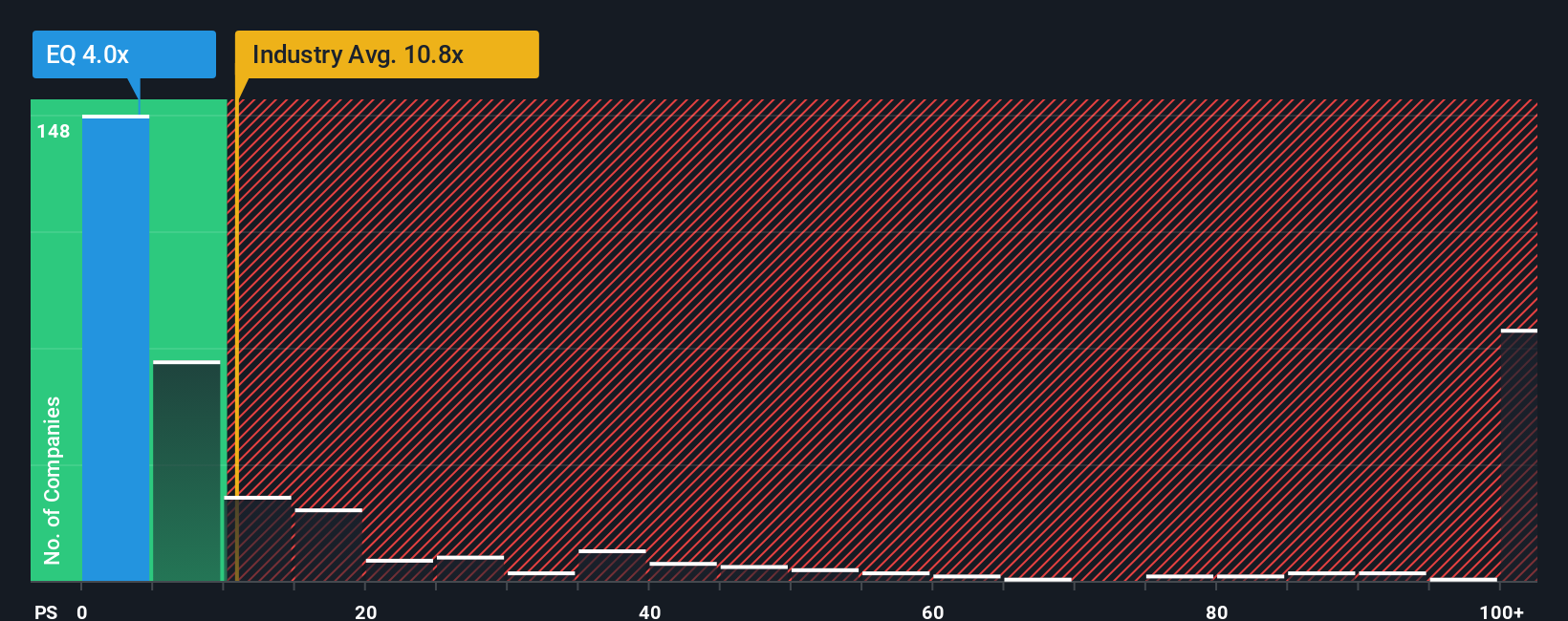- United States
- /
- Biotech
- /
- NasdaqCM:EQ
Investors Don't See Light At End Of Equillium, Inc.'s (NASDAQ:EQ) Tunnel
Equillium, Inc.'s (NASDAQ:EQ) price-to-sales (or "P/S") ratio of 4x might make it look like a strong buy right now compared to the Biotechs industry in the United States, where around half of the companies have P/S ratios above 10.8x and even P/S above 91x are quite common. Nonetheless, we'd need to dig a little deeper to determine if there is a rational basis for the highly reduced P/S.
Check out our latest analysis for Equillium

What Does Equillium's P/S Mean For Shareholders?
Equillium could be doing better as its revenue has been going backwards lately while most other companies have been seeing positive revenue growth. The P/S ratio is probably low because investors think this poor revenue performance isn't going to get any better. If this is the case, then existing shareholders will probably struggle to get excited about the future direction of the share price.
Want the full picture on analyst estimates for the company? Then our free report on Equillium will help you uncover what's on the horizon.Is There Any Revenue Growth Forecasted For Equillium?
There's an inherent assumption that a company should far underperform the industry for P/S ratios like Equillium's to be considered reasonable.
In reviewing the last year of financials, we were disheartened to see the company's revenues fell to the tune of 61%. At least revenue has managed not to go completely backwards from three years ago in aggregate, thanks to the earlier period of growth. Therefore, it's fair to say that revenue growth has been inconsistent recently for the company.
Turning to the outlook, the next three years should bring diminished returns, with revenue decreasing 100% per year as estimated by the dual analysts watching the company. Meanwhile, the broader industry is forecast to expand by 127% per year, which paints a poor picture.
In light of this, it's understandable that Equillium's P/S would sit below the majority of other companies. However, shrinking revenues are unlikely to lead to a stable P/S over the longer term. Even just maintaining these prices could be difficult to achieve as the weak outlook is weighing down the shares.
What We Can Learn From Equillium's P/S?
Typically, we'd caution against reading too much into price-to-sales ratios when settling on investment decisions, though it can reveal plenty about what other market participants think about the company.
With revenue forecasts that are inferior to the rest of the industry, it's no surprise that Equillium's P/S is on the lower end of the spectrum. At this stage investors feel the potential for an improvement in revenue isn't great enough to justify a higher P/S ratio. Unless these conditions improve, they will continue to form a barrier for the share price around these levels.
There are also other vital risk factors to consider and we've discovered 5 warning signs for Equillium (3 shouldn't be ignored!) that you should be aware of before investing here.
If these risks are making you reconsider your opinion on Equillium, explore our interactive list of high quality stocks to get an idea of what else is out there.
Valuation is complex, but we're here to simplify it.
Discover if Equillium might be undervalued or overvalued with our detailed analysis, featuring fair value estimates, potential risks, dividends, insider trades, and its financial condition.
Access Free AnalysisHave feedback on this article? Concerned about the content? Get in touch with us directly. Alternatively, email editorial-team (at) simplywallst.com.
This article by Simply Wall St is general in nature. We provide commentary based on historical data and analyst forecasts only using an unbiased methodology and our articles are not intended to be financial advice. It does not constitute a recommendation to buy or sell any stock, and does not take account of your objectives, or your financial situation. We aim to bring you long-term focused analysis driven by fundamental data. Note that our analysis may not factor in the latest price-sensitive company announcements or qualitative material. Simply Wall St has no position in any stocks mentioned.
About NasdaqCM:EQ
Equillium
A clinical-stage biotechnology company, develops therapeutics to treat severe autoimmune and inflammatory, or immuno-inflammatory disorders with unmet medical need in the United States.
Flawless balance sheet with moderate risk.
Market Insights
Community Narratives


